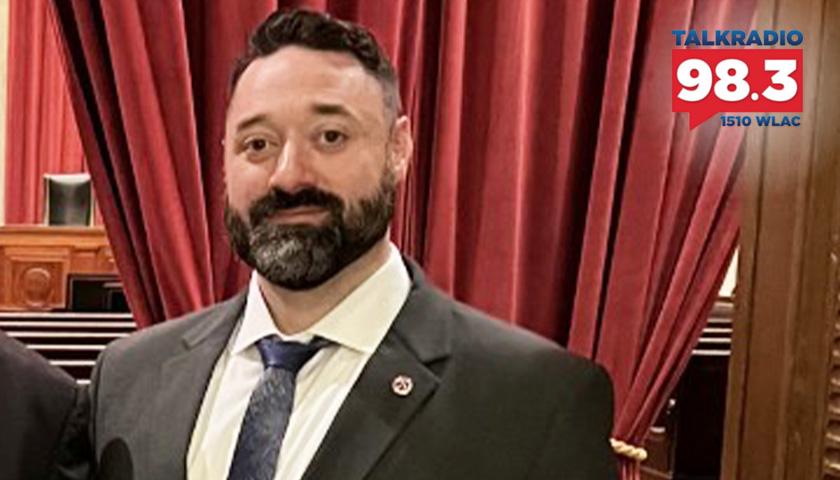Live from Music Row, Monday morning on The Tennessee Star Report with Michael Patrick Leahy – broadcast on Nashville’s Talk Radio 98.3 and 1510 WLAC weekdays from 5:00 a.m. to 8:00 a.m. – guest host Gulbransen welcomed Tennessee AG’s Chief of Staff Brandon Smith in studio to discuss the new strategic litigation unit in the Tennessee AG office.
Gulbransen: In studio, we have the Chief of Staff to the greatest attorney general in the country, Tennessee Attorney General Jonathan Skrmetti’s Chief of Staff, Brandon Smith. Good morning again, sir. How are you?
Smith: Good morning. I’m doing well, bright and early today.
Gulbransen: Let’s talk about the work that the Strategic Litigation Unit is doing, and what is that for one, for those who use colloquialisms more so than the actual titles? Tell us about it.
Smith: Sure. So this past legislative session in the governor’s proposed budget, Governor Lee proposed funding for a strategic litigation team that operates within the AG’s office. The General Assembly was very supportive of this idea and championed it through the budget process. We were very thankful to them for that.
And the result is we’ve got some funding now and some new positions specifically dedicated to what we’re calling strategic litigation, which we’ve been describing as taking on three primary goals.
One is the defense of the constitutionality of state laws which is a team that needs to be a knife fighting litigators who can defend state laws. Like what we’re doing right now with HB 1, for example.
The team will also take on what we were calling corporate accountability which is really our approach at looking at how corporate collusion on the ESG side of things is disrupting the market and harming consumers.
And thirdly, strategic litigation will be the tip of the spear for our office in pushing back on federal regulatory overreach. So some of our complex litigation against the USDA or the Department of Education, or the EOC like we’ve taken on in the past.
And the reason for this is it’s multifaceted. One, we’ve got a ton of great people in the AG’s office who just are not very political and want to just do the day-to-day work of serving the people of Tennessee. They’ve got to handle this criminal appeal and shut down this shady scam that’s popped up and defend an agency in court.
And so the division of the team actually allows us to insulate from folks who aren’t otherwise wanting to do that sort of work to put all this more partisan or at times viewed as partisan or at times viewed as just controversial work in a group of people who are wanting to do that type of work specifically.
So it’s good internally for office morale, I think. But two, it’s just we needed some more positions to take this work on. The role of state attorneys general across the country has changed dramatically starting at the end of George W. Bush’s administration and just getting more and more in this direction where state AGs are more and more becoming the first and last line of defense against federal regulatory action.
We are the ones defending the principles of federalism and separation of powers in large part because we’re in the best position to do so as equal sovereigns with the federal government. States have the ability to bring claims and arguments that are powerful and persuasive, especially when we’re operating together as we frequently do.
That sort of litigation has just rocketed up o over the last 20 years, and I imagine will continue to be there. Your listeners might note that. That’s also been around the time that the administrative state has gotten pretty broad. So there’s definitely a connection between the two.
Third, we needed the positions to be able to create a litigation team on top of all the other great work of the office. We just had a manpower shortage and taking on this stuff is not easy. So sure, it’s just one case, but there’s a big difference between, our office regularly handling torts filed against the state, a slip and fall at a state park.
That’s a very different type of case than a multi-state investigation and lawsuit against a federal agency. So just the workload on these cases is intense and has a need for a lot of focus from our folks.
The strategic litigation unit is going to be really active. Obviously, it’s gonna take us a little bit of time to ramp up. The budget doesn’t kick in until later this summer. But when it does, I think we’re going to be able to recruit some other really good attorneys into the office in addition to the folks we already have. And we’re excited to see what that team’s going to do.
Gulbransen: I knew about it, of course, but in the most exciting office in the state, in my personal opinion, the attorney general’s office, that sounds like that’s going to be the most exciting unit in that office.
Listen to today’s show highlights, including this interview:
– – –
Tune in weekdays from 5:00 – 8:00 a.m. to the Tennessee Star Report with Michael Patrick Leahy on Talk Radio 98.3 FM WLAC 1510. Listen online at iHeart Radio.
Photo “Brandon Smith” by Tennessee Attorney General.




